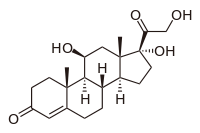
Photo from wikipedia
Background Research on the increasing incidence of allergic diseases evidenced the role of diet as a potential key factor. Diet can modulate the low-grade systemic inflammation related to obesity and… Click to show full abstract
Background Research on the increasing incidence of allergic diseases evidenced the role of diet as a potential key factor. Diet can modulate the low-grade systemic inflammation related to obesity and several diseases. There are no published data on drug allergy. Aim To investigate a potential association between diet, including dietary inflammatory index (DII), and drug allergy. Also, to evaluate correlations between diet and obesity, inflammatory and metabolic parameters in patients with drug allergy. Methods Ninety consecutive patients studied for suspected drug allergy were evaluated in terms of dietary parameters, anthropometric measurements, bioimpedance and biochemical analysis. DII was calculated based on information collected from a food frequency questionnaire. Results After diagnostic work-up, 39 patients had confirmed drug allergy and 45 excluded, representing the study group and the control group, respectively. The majority (79%) were female, with mean age of 39.58±13.3 years. The 84 subjects revealed an anti-inflammatory diet pattern. No significative difference was found in DII scores between drug allergic patients and controls (-3.37±0.95 vs -3.39±0.86, p = 0.985). However, the patients with drug allergy revealed higher obesity and inflammatory parameters. A significative negative correlation was found between DII and adiponectin levels, in the control group (r = -0.311, p = 0.040). In the patient group, a significative positive correlation was observed between DII and triglycerides (r = 0.359, p = 0.032). No other correlations were found between DII and the assessed parameters. Patients with drug allergy presented a significative higher intake of mono-unsaturated fatty-acids comparing to controls (19.8±3.7 vs 17.8 ± 4.0, p = 0.021). No other statistically significant differences were achieved in dietary parameters, between patients and controls. Conclusion The population assessed in this study revealed an anti-inflammatory diet profile. Although we have found in a previous work that the same patients with drug allergy revealed higher obesity and inflammatory parameters, the DII did not allow to distinguish between patients with drug allergy or controls. The DII scores correlated with triglycerides levels in the drug allergy patients and inversely with adiponectin levels in the control group. Larger studies are needed to clarify the potential role of the diet in drug allergy and its outcomes.
Journal Title: PLOS ONE
Year Published: 2022
Link to full text (if available)
Share on Social Media: Sign Up to like & get
recommendations!